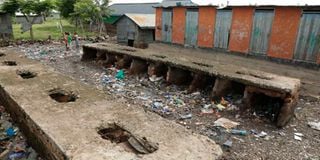Premium
Eradicate open defecation

Abandoned toilets in Remba Island, Homa Bay County. Ending open defecation is imperative to protecting groundwater, which is under threat from climate change.
The theme for this year’s World Toilet Day, which is marked on November 19 every year, was “Making the invisible visible”, focusing on the impact of the sanitation crisis on groundwater, exploring how inadequate sanitation systems spread human waste into rivers, lakes and soil, polluting underground water resources.
A recent story in this newspaper, “The family without a toilet”, revealed how residents of Mukuru Kwa Njenga slum in Nairobi suffer from a lack of toilets, forcing them to improvise disposal of faecal waste, which finds its way to water sources. Poor sanitation contaminates drinking water sources, rivers, beaches and food crops, spreading deadly diseases.
Due to poverty and high population density, 5.6 million Kenyans practise open defecation. Sanitation and hygiene gaps cost the economy $324 million (Sh40 million) yearly with open defecation being blamed for 6,600 child deaths from diarrhoea, 80 per cent due to poor water, sanitation and hygiene.
Kenya is a signatory of the 2016 Ngor Declaration, committing to focus on the poorest, most marginalised and under-served by progressively eliminating inequalities and eradicating open defecation by 2030. It committed to investing 0.5 per cent of GDP in sanitation but only sets aside 0.2 per cent.
The government should increase the investment in sanitation and hygiene to improve sanitation and construction of toilets, especially in informal settlements and public places like markets and schools.
Secondly, county governments should subsidise toilet construction, especially for poor rural households, who mostly practise open defecation. Use community-based outreaches for public education.
Thirdly, user-friendly toilets should be scaled up to accommodate persons living with disabilities.
Ending open defecation is imperative to protecting groundwater, which is under threat from climate change. It will also ensure that Kenya moves up the sanitation ladder towards SDG 6.
Ms Pamella is a communication and media technology student at Maseno University. [email protected].





